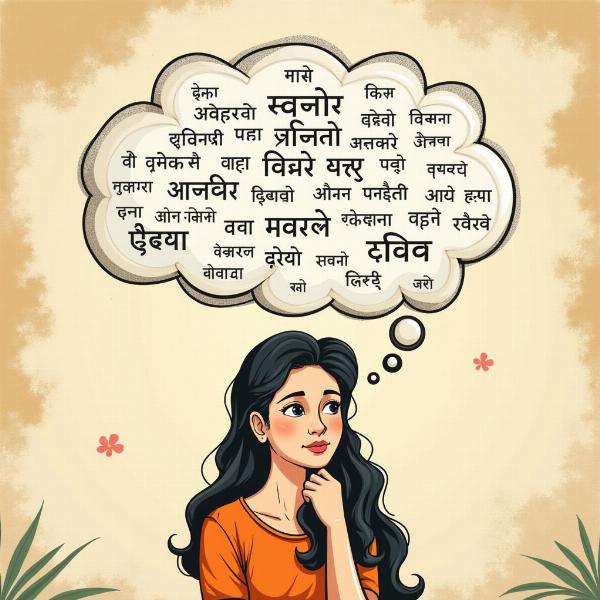Understanding the nuances of “my own expectations” in Hindi is crucial for anyone seeking to navigate the rich tapestry of Indian culture and communication. While a direct translation might suffice in some contexts, truly grasping its meaning requires delving into the cultural implications and exploring various synonymous expressions. This understanding is essential not just for casual conversations, but also for professional interactions, academic pursuits, and even personal reflection. “My own expectations” speaks to the internal desires and anticipated outcomes we hold, shaped by our individual experiences, values, and aspirations.
Unpacking “My Own Expectations” in Hindi: A Deep Dive
The core concept of “my own expectations” revolves around the idea of personal aspirations and anticipated results. In Hindi, several phrases capture this essence, each with its own subtle shades of meaning. Let’s examine some of the most common and versatile expressions:
-
अपनी उम्मीदें (apnī ummīdeṅ): This is perhaps the most straightforward translation, literally meaning “my hopes” or “my expectations.” It’s a widely understood and versatile phrase, suitable for both formal and informal contexts.
-
अपनी आकांक्षाएं (apnī ākāṅkṣāeṅ): This term carries a slightly more formal and aspirational tone, often implying a deeper longing or ambition. It’s suitable when discussing career goals, personal growth, or other significant aspirations.
-
अपनी अपेक्षाएं (apnī apekshāeṅ): This phrase emphasizes the anticipatory aspect of expectations, focusing on what one believes should or will happen. It can be used in situations where there’s a sense of entitlement or a clear expectation of a certain outcome.
-
मेरी अपनी उम्मीदें (merī apnī ummīdeṅ): Adding “merī” (my) before “apnī” (own) further emphasizes the personal nature of the expectations, highlighting individual ownership and responsibility.
 My Own Expectations Hindi Translation
My Own Expectations Hindi Translation
Navigating Cultural Context: Expectations and Indian Society
Indian culture places a strong emphasis on family, community, and social harmony. This interconnectedness often influences individual expectations, shaping them around collective values and societal norms. Understanding this cultural context is crucial for accurately interpreting and responding to expressions of personal expectations. For example, expectations regarding marriage, career choices, and family responsibilities are often intertwined with cultural traditions and societal pressures.
How to Express “My Own Expectations” Effectively
Choosing the right phrase to express “my own expectations” depends on the specific context and the desired nuance. Consider the following examples:
-
Formal context: When discussing career aspirations in a job interview, “अपनी आकांक्षाएं (apnī ākāṅkṣāeṅ)” would be an appropriate choice.
-
Informal context: When talking to a friend about weekend plans, “अपनी उम्मीदें (apnī ummīdeṅ)” would be more suitable.
-
Emphasis on personal responsibility: When expressing expectations within a family setting, “मेरी अपनी उम्मीदें (merī apnī ummīdeṅ)” could be used to emphasize personal ownership.
Managing Expectations: A Key to Personal Well-being
Managing one’s own expectations is crucial for personal well-being. Unrealistic or overly high expectations can lead to disappointment and frustration. Learning to balance aspirations with realistic possibilities is a valuable life skill, particularly within the context of Indian society, where societal pressures can sometimes contribute to heightened expectations.
Conclusion
Understanding the various ways to express “my own expectations” in Hindi, along with the cultural context surrounding expectations in Indian society, is essential for effective communication and intercultural understanding. By choosing the right phrase and managing expectations effectively, individuals can navigate personal and professional relationships with greater clarity and sensitivity. This understanding empowers individuals to articulate their desires and aspirations while respecting cultural nuances and fostering meaningful connections.
FAQ
-
What is the most common Hindi translation for “my own expectations”? The most common translation is “अपनी उम्मीदें (apnī ummīdeṅ).”
-
What is the difference between “अपनी उम्मीदें” and “अपनी आकांक्षाएं”? “अपनी उम्मीदें” refers to general expectations, while “अपनी आकांक्षाएं” implies deeper aspirations or ambitions.
-
How does Indian culture influence personal expectations? Indian culture’s emphasis on family and community often shapes individual expectations around collective values and social norms.
-
Why is managing expectations important? Managing expectations is crucial for personal well-being and avoiding disappointment.
-
How can I learn more about Hindi language and culture? Resources like Meaning-Hindi.in can provide valuable insights into Hindi language, culture, and translation services.
Connect with Meaning-Hindi.in for Expert Hindi Translation Services
Meaning-Hindi.in is your trusted partner for accurate and culturally sensitive Hindi translation services. We specialize in a wide range of translation needs, from business and legal documents to technical manuals and website localization. Our team of expert linguists understands the nuances of Hindi and Indian culture, ensuring that your message is conveyed effectively and respectfully. Whether you need help with translating “my own expectations” or any other phrase, we’re here to help. Contact us today at [email protected] or call us at +91 11-4502-7584 to learn more about our services. Meaning-Hindi.in is committed to providing high-quality, reliable translations that bridge language barriers and foster understanding.